Detoxing Microplastics, Metal, and Vaccine contamination
Detoxing any time soon? The growing concern surrounding microplastics, metal contamination, and vaccine contamination is pushing people to find effective ways to protect themselves from these potential hazards. This article will explore various natural ingredients known for their detoxifying and health-supporting properties. These ingredients can help rid the body of unwanted toxins and heavy metals, support immune system function, and maintain overall health.
Natural Chelators and Detoxifiers
EDTA (Ethylenediaminetetraacetic Acid): EDTA is a synthetic amino acid that has ben shown to effectively bind to heavy metals in studies, such as lead, mercury, and cadmium, and helps remove them from the body.
EDTA chelation therapy has been used to treat heavy metal poisoning, cardiovascular disease, and other health conditions related to toxic metal buildup. It has been shown to have an impact on Nitric Oxide Synthase production, health and other important factors.
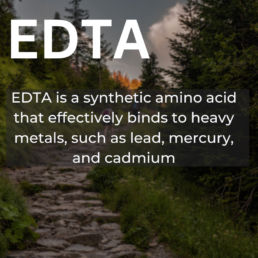
Chlorella Algae: Chlorella is a type of single-celled green algae known for its detoxifying properties. It is rich in chlorophyll, which binds to heavy metals and helps remove them from the body. Additionally, Chlorella supports the immune system, aids digestion, and promotes overall well-being.
EDTA Is A Natural Ingredient
Since it is a natural ingredient, using it daily in a chelation therapy supplement is a no brainer, as it has no downside. It has nutritional value, other benefits for your health, too many to get into, and is an easy and affordable means to support your nitric oxide synthase pathways.

Modified Citrus Pectin: Modified Citrus Pectin (MCP)
MCP is a soluble fiber derived from citrus fruits. It has been shown to bind to heavy metals, such as lead and mercury, and help remove them from the body. MCP also supports digestive health, helps maintain healthy cholesterol levels, and has potential anti-cancer properties according to some studies.
Several studies and reviews have indicated that Modified Citrus Pectin (MCP) may have anti-cancer properties. Here are some key findings from various sources:
- General Potental Anti-Cancer Properties: MCP is recognized as a dietary supplement with potential in oncology. It has shown abilities in anti-cancer, anti-metastases, immune-boosting, and heavy metal detoxification. Specifically, MCP blocks Galactin-3, an important inflammatory compound, and may enhance the effectiveness of chemotherapy drugs. Research suggests that MCP can help reduce metastases in prostate and other cancers, reducing the proliferation of cancer cells both in vitro (in test tubes) and in vivo (in living organisms).
- Therapeutic Agent for Various Conditions: MCP, derived from citrus peels, is recommended as a therapeutic agent not only for immune support but also possibly for for cancer, heavy metal toxicity, and fibrotic diseases. This indicates a broad spectrum of potential health benefits, including its potential role in cancer therapy.
- Inhibitory Effect on Liver Metastases: In a study focusing on a mouse colon cancer model, modified citrus pectin demonstrated an inhibitory effect on liver metastases. This suggests its potential effectiveness in reducing the spread of cancer to the liver from other areas.
- Beneficial Effects on Colon and Breast Cancer: Data suggest that MCP, specifically, is beneficial in the development and spread of malignancies, particularly in colon and breast cancer. This further adds to its profile as a bioactive food polysaccharide with potential cancer-preventive properties.
- Chemopreventive and Antitumoral Activities: Both pectin and pH- or heat-modified pectin have shown chemopreventive and antitumoral activities against some aggressive and recurrent cancers. This review focuses on how these forms of pectin display these activities and explores the possible underlying mechanisms.
MCP Has Immune Modulating Effects
These studies and reviews highlight the growing interest in MCP as a natural substance with potential anti-cancer properties. While more research is needed to fully understand its mechanisms and efficacy in humans, the current findings are promising and suggest a potential role for MCP in cancer prevention and treatment. We are in no way saying that this is a cure, or our product can cure or have any effect on cancer. Our goal is to merely point out the research, possible implications and health benefits.
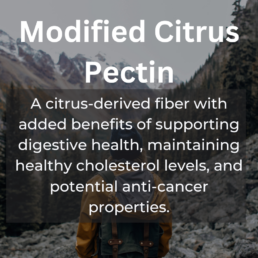
Leaf Extract : Cilantro
Cilantro a popular culinary herb, contains compounds that bind to heavy metals and facilitate their removal from the body. The Cilantro leaf’s extract has been used as a natural chelator to support detoxification processes, particularly for mercury and lead.
-
Detoxification
Cilantro is known for its potential detoxifying effects, particularly those related to removing heavy metals from the mammalian / human body. Compounds that are commonly found in cilantro may bind to common toxic metals like lead, arsenic, and mercury, aiding in their elimination from the body via natural means.
-
Antioxidant Properties
Cilantro contains powerful and useful antioxidants, which can help protect the body against damage from free radicals, nasty little things that you for sure do not want! These antioxidants include quercetin, tocopherols, and terpenoids, which contribute to reducing oxidative stress and may help prevent certain chronic diseases and can also help extend the life of nitric oxide, an important nutrient/chemical vital for cardiovascular health!
-
Anti-inflammatory Effects
Cilantro has been found to have anti-inflammatory properties. Chronic inflammation is a root cause of many health conditions, if not most of today’s biggest diseases, so consuming foods with anti-inflammatory properties like cilantro can be beneficial for overall health and common sense disease prevention.
-
Digestive Health
Cilantro can aid in digestion and may help in settling an upset stomach. It has been used traditionally for its digestive benefits, helping with indigestion, flatulence, and bloating.
-
Antimicrobial Properties
Some studies suggest that cilantro has antimicrobial properties, meaning it can help fight against certain bacteria and fungi. This can be beneficial in preventing foodborne illnesses when cilantro is used in cooking.
-
Heart Health
Cilantro may have a positive effect on heart health. It can help lower bad cholesterol (LDL) levels and increase good cholesterol (HDL). Also, its antioxidants may help in preventing damage to the heart and blood vessels.
-
Blood Sugar Regulation
There is some evidence that cilantro may help in managing blood sugar levels, making it a potentially beneficial herb for people with or at risk of diabetes.
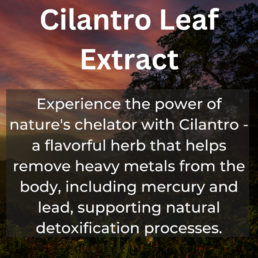
Shilajit Extract: Shilajit is a natural resinous substance found in the Himalayan mountains. It is rich in fulvic acid, a powerful detoxifying agent that binds to heavy metals and other environmental toxins, helping to remove them from the body. Shilajit also supports energy production, cognitive function, and overall vitality.

Immune System and Liver Support & Detoxing
Amazing Zeolite
Zeolite is a group of microporous minerals with a unique cage-like structure, which allows it to trap and remove heavy metals and other toxins from the body. Zeolite has been used to support detoxification, improve immune function, and promote overall health.
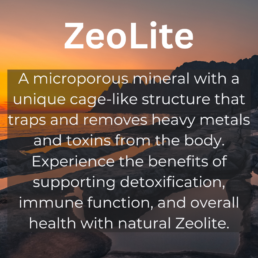
Glutathion & NAC
Glutathione is a powerful antioxidant that is crucial in detoxification and immune system function. The Glutathione Precursor Support Blend provides the necessary amino acids (glutamic acid, cysteine, and glycine) to help the body produce glutathione, thus supporting detoxification and immune health.
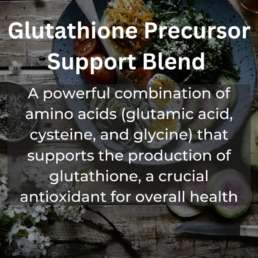
Alpha Lipoic Acid: Alpha Lipoic Acid
(ALA) is a potent antioxidant that helps neutralize free radicals and supports the body’s natural detoxification processes. ALA also assists in regenerating other antioxidants, such as vitamin C and glutathione, further enhancing the body’s defense against toxins and oxidative stress.
Uva Ursi Leaf Powder
Uva Ursi is an herbal remedy with a long history of use for its diuretic and urinary tract health-supporting properties. It is also believed to help remove toxins and heavy metals from the body through increased urine production.
Milk Thistle Seed Powder
Milk Thistle is a well-known herb that supports liver health and detoxification. Its active compound, silymarin, has been shown to protect liver cells from damage and promote the regeneration of damaged liver tissue. Milk Thistle can help the body effectively process and eliminate toxins and heavy metals by supporting liver function.
Supporting the Detoxification Process
Cellulose Capsule: Cellulose capsules are a plant-based alternative to traditional gelatin capsules, providing a suitable option for vegetarians and vegans. These capsules can protect sensitive ingredients from stomach acid, ensuring their release in the small intestine for maximum absorption and effectiveness.
Conclusion
As concerns about microplastics, metal contamination, and vaccine contamination continue to rise, incorporating natural detoxifying ingredients into one’s daily routine can help support the body’s natural ability to eliminate toxins and heavy metals. The combination of chelators, immune system supporters, and liver-supporting ingredients discussed in this article can provide a comprehensive approach to maintaining overall health and well-being in the face of environmental challenges.
How To Boost The Nitrates in Beetroot & Vegetables
How can you boost the nitrates in beetroot and vegetables, and why should you care? Let’s dive right in and find out!
Understanding Nitrates in Beetroots & Veggies
Nitrates are essential chemical and nutritional components in plants, especially in beetroots and arugula, both contributing significantly to their nutritional and health-promoting profile.
In the body, nitrates from beetroots and other veggies like arugula are converted into nitric oxide, which plays a crucial role in cardiovascular health, immune health, and brain function and is known for lowering blood pressure and improving blood flow.
There are literally thousands of studies on the benefits of nitric oxide from many sources like arginine, citrulline, and beetroot. If you like to garden, it makes a lot of sense to learn how you can increase the amount of nitrate in your food since it offers so many incredible health benefits.
Beetroot & Nitrates

High Nitrate Veggies
Arugula (Rocket)
Arugula is renowned for its very high nitrate levels, making it one of the top vegetables in this category.
Ideal Growing Conditions: Arugula prefers moderate to cool climates. It is versatile and can be grown in various regions across the United States, especially those with mild winters.
Beetroot
Beetroots are well-known for their substantial nitrate content, which benefits health.
Ideal Growing Conditions: Beetroots grow best in cooler climates. They are adaptable and can thrive in many areas across the U.S., particularly in regions with temperate climates.
Celery
Celery is another vegetable with a high concentration of nitrates, alongside being a low-calorie and high-water-content vegetable.
Ideal Growing Conditions: Celery requires a long growing season and consistent moisture. It grows well in regions with steady temperatures and ample water supply, which can be found in various parts of the United States.
These vegetables, with their high nitrate content, have diverse growing requirements, so almost anyone reading this article should be able to grow at least one of these.
Arugula’s ability to adapt to a range of climates, beetroots’ preference for cooler temperatures, and celery’s need for a consistent, moist environment illustrate the variety of conditions needed to grow and cultivate these nutrient-rich vegetables successfully.
To enhance the nitrate content in vegetables such as arugula, beetroot, and celery, it’s essential to focus on effective soil management and various fertilization techniques.
Here’s an integrated approach to increasing the nitrate content in your garden produce, aiming to boost overall health benefits:
Nitrogen-Rich Fertilization
Select fertilizers high in nitrogen since nitrates are a form of nitrogen absorbed by plants. Options like calcium nitrate, potassium nitrate, or ammonium nitrate are effective. Organic alternatives such as blood meal or fish emulsion, also rich in nitrogen, can be used. It’s important to apply these fertilizers regularly as per the manufacturer’s guidelines. Leafy greens like arugula might require more frequent applications to maintain high nitrate levels and support rapid growth.
Soil Management
Regular soil testing is a key step in monitoring nitrate levels, allowing you to adjust your fertilization strategy effectively. Nitrates are crucial for healthy plant growth, and understanding their levels in your soil is fundamental.
Maintaining a soil pH between 6.0 and 7.0 helps maximize nitrogen availability for most vegetables. Adding organic matter such as compost or well-rotted manure improves soil structure and microbial activity, aiding in converting organic nitrogen sources to nitrates.
Irrigation Practices
Consistent watering is vital, as water stress can affect a plant’s ability to absorb nitrates. However, it’s equally important to avoid overwatering, which can cause the leaching of nitrates from the soil, reducing their availability to plants.
Crop Rotation
Incorporating nitrogen-fixing crops like legumes in your crop rotation can enhance the nitrogen content of the soil for the subsequent growing season, benefiting the next crop in terms of nitrate availability.
Harvest Timing
Harvesting your vegetables at the right time is crucial. Younger arugula leaves or medium-sized beetroots often have higher nitrate concentrations than over-matured ones. Since commercial farms are interested in larger-size veggies as they sell for more money, this is yet another reason why growing your own is advisable.
Mulching
Applying organic mulch around the plants is beneficial. Mulch helps maintain soil moisture and temperature, fostering better absorption of nitrates by the plants.
Controlled Environment Growing
Consider using controlled environments such as hydroponic systems or greenhouses. These settings allow for precise control of nutrient levels, including nitrogen, which can lead to higher nitrate concentrations in the plants.
By adopting these strategies, you can effectively increase the nitrate content in vegetables like arugula, beetroot, and celery, enhancing their nutritional value and contributing to a healthier diet.
Arugula Can Be Very High In Nitrates

Unraveling the Best Nitric Oxide Boosters
What are the best nitric oxide boosters? The quest for optimal health often leads us to natural solutions like Arginine and beets, both known for their ability to boost nitric oxide levels. In this comprehensive exploration, we delve into the science behind these two powerhouses, evaluating their effectiveness and understanding the role of nitric oxide in the human body and to understand what are the best nitric oxide boosters.
The Nitric Oxide Story
Nitric oxide, a simple molecule with immense biological importance, plays a critical role in various bodily functions. It’s primarily produced in the cardiovascular and nervous systems and acts as a neurotransmitter. The molecule gained significant attention after being named the “Molecule of the Year” in 1992 and has been the subject of over 140,000 studies, leading to numerous pharmaceutical developments like Viagra.
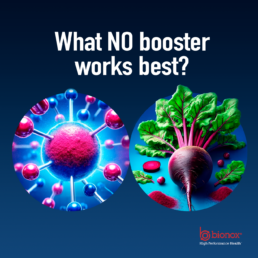
Arginine: The Traditional Nitric Oxide Booster
Arginine, a semi-essential amino acid, has long been the focal point in nitric oxide research. The body naturally produces Arginine, which is also found in various foods. It transforms into nitric oxide through an enzyme called nitric oxide synthase, present in the endothelium of arteries. However, the effectiveness of Arginine supplementation has been debated, especially concerning its conversion rate into nitric oxide in older individuals. Despite these discussions, Arginine’s role in boosting nitric oxide remains substantiated by extensive research and clinical practice.
Beets: The Emerging Nitric Oxide Source
Beets, and other nitrate-rich foods like arugula and spinach, represent an alternative pathway for nitric oxide production. Some people who have products to sell are saying that only beets rank among the best nitric oxide boosters.
The nitrates in these foods convert into nitric oxide through a process involving oral microbiome and stomach acid, independent of the nitric oxide synthase pathway. This feature makes them particularly beneficial for individuals with endothelial dysfunction. However, sourcing quality nitrate-rich supplements can be challenging, and factors like oral microbiome health and stomach acid levels significantly influence their effectiveness.
Comparing Arginine and Beets
When comparing arginine and beets, each has its advantages and drawbacks. Arginine’s benefits are well-researched, and it’s naturally produced by the body and it is well known as one of the best nitric oxide boosters around. However, it may not be as effective in older individuals due to decreased nitric oxide synthase activity. On the other hand, beets offer a nitric oxide synthase-independent pathway but rely heavily on the individual’s oral and gut health for conversion.
Practical Applications and Products
In clinical practice, understanding each patient’s unique health profile is crucial when choosing between Arginine and beets. For those with compromised nitric oxide synthase activity or seeking a natural alternative, beets and other nitrate-rich foods can be an excellent choice. Conversely, Arginine supplements, often combined with other co-factors and antioxidants, can offer a more controlled and research-backed approach.
Several products on the market cater to these needs, ranging from Arginine-based supplements to beetroot extracts and greens powders high in nitrates. Additionally, testing methods like saliva nitrate strips and digital pulse wave analyzers can help track nitric oxide levels and arterial health, guiding supplementation choices.
Poorly Designed Studies
The Vascular Interaction With Age in Myocardial Infarction (VINTAGE MI) clinical trial, a notable study on the use of L-arginine in acute myocardial infarction patients, has sparked considerable debate in the medical community. This study, published in the January 2006 issue of the Journal of the American Medical Association (JAMA), sought to determine if adding L-arginine to standard post-heart attack therapy could reduce vascular stiffness and improve heart function over a six-month period.
Study Design and Findings
- Context & Objective: Recognizing L-arginine as a substrate for nitric oxide synthase and its potential to reduce vascular stiffness, the study aimed to assess its efficacy in improving cardiac function post-heart attack.
- Methodology: It was a single-center, randomized, double-blind, placebo-controlled trial, enrolling 153 patients who had experienced a first ST-segment elevation myocardial infarction. The participants were randomized to receive either L-arginine (goal dose of 3 g three times a day) or a placebo for six months.
- Results: The study found no significant improvement in vascular stiffness or left ventricular ejection fraction in the L-arginine group compared to the placebo group. Notably, six participants (8.6%) in the L-arginine group died during the study, while no deaths were reported in the placebo group. This led to safety concerns and the early closure of the trial by the data and safety monitoring committee.
Criticisms and Controversies
The VINTAGE MI trial has been criticized for several reasons:
- Dosage and Administration: Some experts argue that the dosage of L-arginine used was inadequate for therapeutic effects. Furthermore, questions have been raised about the absorption and metabolism of L-arginine in the patients enrolled in the study.
- Patient Selection: Concerns have been raised regarding the specific cohort of patients chosen for the study, particularly their health status and how representative they were of the general population experiencing heart attacks.
- Study Design: Critics have pointed out potential flaws in the study’s design, including the single-center nature of the trial and the methods used to measure outcomes such as vascular stiffness and heart function.
Implications for Clinical Practice
While the VINTAGE MI trial suggests potential risks associated with L-arginine supplementation post-heart attack, it is important to consider these results within the broader context of L-arginine research and cardiovascular health. The role of L-arginine in cardiovascular therapy, particularly in non-post-infarction contexts, continues to be supported by a body of research indicating its benefits in vascular health and nitric oxide production.
The VINTAGE MI trial represents a critical piece of research in the ongoing evaluation of L-arginine’s role in heart health. However, its findings should be interpreted with caution and in conjunction with other studies. As with any supplement or medication, the suitability of L-arginine for individual patients should be assessed based on a comprehensive understanding of their overall health, the specific health condition being treated, and the broader scientific evidence available.
In the debate between Arginine and beets for nitric oxide boosting, there’s no one-size-fits-all answer. Each has its unique benefits and limitations. The choice largely depends on individual health factors, goals, and preferences. Doing a good heavy metal detox is going to be very helpful in any case, no matter what you take.
By understanding the nuances of these nitric oxide boosters, one can make informed decisions to optimize health and wellness.
If you would like in depth information watch my video presentation from ANMA below.
10 Reasons Why Beetroot is Bad for Your Health

At first glance, the question why beetroot is bad for your health seems to challenge everything you know about or have heard about this nutritionally dense super-food.
However, there are caveats we need to consider. It is not always good, not always effective, and not always from a good source. Let’s dive into why beetroot is bad for your health or, better phrased, why it could be bad in some instances!
10 Reasons Why Beetroot Is Bad For Your Health
Reason #1
1. Diabetes and Blood Sugar Management:
Individuals with diabetes may need to limit beetroot intake due to its sugar content. If you take a cheap beetroot powder, it’s probably only filler. Full of sugar, and it’s only purpose is to take your money and turn your poop red.
Lesson: Get beetroot with guaranteed nitrate amounts and low-sugar.
Reason #2
2. Pre-existing Kidney Stones:
Some beetroot is high in oxalates, which can contribute to kidney stone formation in susceptible individuals. Oxalates, or oxalic acid, are naturally occurring compounds found in many commonly consumed plants, including beetroot.
In certain susceptible individuals, particularly those with a tendency to form kidney stones, oxalates can bind with calcium. This take place in the urine and forms calcium oxalate kidney stones. These are the most common type of kidney stones.
High levels of oxalates can also interfere with the absorption of certain minerals, leading to deficiencies. For most people, dietary oxalates are not a problem, but for those at risk of kidney stones or with certain health conditions, it’s often recommended to limit oxalate intake.
Lesson: Get a pure beetroot with NO OXALATES
Reason #3
3. Compromised Immune Systems:
Beetroots from sources without proper sanitary controls could harbor pathogens, posing a risk to those with weakened immune systems.
Individuals with compromised immune systems, such as those undergoing chemotherapy, who are living with HIV/AIDS, or who may be taking immunosuppressive medications, need to be particularly cautious about the foods they consume.
Their bodies are less equipped to fight off infections, which means that consuming produce that has not been properly cleaned or that comes from sources with inadequate sanitation can pose serious health risks.
Beetroots, like any raw vegetables, can carry bacteria, viruses, or parasites if they are not grown, harvested, stored, and prepared safely. This can include common foodborne pathogens like E. coli, Salmonella, and Listeria, which can lead to severe illness in immunocompromised individuals.
These individuals should ensure that any beetroot they consume is from a reliable source, thoroughly washed, and cooked if necessary to reduce the risk of foodborne illness. For most it makes more sense to purchase a refined and standardized beetroot supplement.
Reason #4
4. Medication Interference:
Beetroot may interact with certain medications, such as blood thinners, due to its vitamin K content.
Beetroot contains some vitamin K, which plays a key role in blood clotting. For individuals taking blood-thinning medications like warfarin, consistent vitamin K intake is crucial because fluctuations can affect the medication’s effectiveness.
A sudden increase in vitamin K can lessen the blood-thinning effect, potentially leading to clot formation, while a decrease can enhance the effect of the medication, increasing the risk of bleeding.
Therefore, it’s important for individuals on such medications to maintain a steady intake of vitamin K and to consult with their healthcare provider before making dietary changes that include foods like beetroot, which has a higher vitamin K content.
Lesson: Work closely with your healthcare provider if you are on any of these medications.
Reason #5
5. Blood Pressure Fluctuations:
For those with low blood pressure, the blood-pressure-lowering effect of beetroot could potentially cause issues. Beetroot contains dietary nitrates, which the body converts into nitric oxide, a molecule that dilates blood vessels and can lower blood pressure. This is generally beneficial for those with high blood pressure; however, it can be problematic for individuals with hypotension (low blood pressure). For these individuals, consuming beetroot could further lower their blood pressure, leading to symptoms like dizziness, fainting, and blurred vision.
It’s essential for people with low blood pressure to consult with a healthcare provider before adding high-nitrate foods like beetroot to their diet to avoid exacerbating their condition.
Lesson: Take beetroot to lower your blood pressure if it is high!
Reason #6
6. Irritable Bowel Syndrome (IBS):
The high fiber content in beetroot can exacerbate symptoms in individuals with IBS. Beetroot is high in fiber, which is generally considered beneficial for digestive health for most people. However, for individuals with Irritable Bowel Syndrome, high-fiber foods can sometimes trigger symptoms such as abdominal pain, bloating, and altered bowel habits (either constipation or diarrhea).
The reason for this is that the digestive system of someone with IBS might be sensitive to certain types of fiber or to the increased bulk and gas production that comes with fiber intake. Therefore, it’s advisable for Irritable Bowel Syndrome sufferers to introduce high-fiber foods like beetroot slowly and in small amounts and to consult with a dietitian or doctor to manage their condition effectively.
Lesson: Use caution if you have IBS.
Reason #7
7. Non-Standardized Nitrate Levels: Without standardized nitrate levels, beetroot products may not provide consistent health benefits. Beetroot’s health benefits are largely attributed to its nitrate content, which the body converts into nitric oxide, a compound that aids in blood vessel dilation circulation and improves blood flow to organs, the brain, and skin, as well as the heart.
However, there is a big problem: the nitrate content in beetroot can vary widely depending on the soil quality, the beetroot variety, and farming practices. Non-standardized nitrate levels mean that the consumer cannot always be sure of the amount of nitrate they are ingesting with each serving, which can lead to inconsistent health benefits.
For those of us seeking the cardiovascular benefits of nitrates, standardized levels are important to ensure they are consuming an effective and safe amount.
Lesson: Buy beetroot with standardized nitrates!
Reason #8
8. Insufficient Intake:
Not consuming an adequate amount of beetroot and its associated nitrates may result in no significant health benefits. For beetroot to confer its cardiovascular and endurance benefits, it needs to be consumed in amounts that provide a sufficient dose of its active compounds, particularly nitrates. At a minimum each dose should have at least 100mg of nitrates to have any effect.
If an individual consumes beetroot in very small quantities, the intake of these beneficial compounds may not be enough to make a significant impact on health. It’s similar to taking a medicine in a dose that’s too low to be effective; you won’t see the desired results. Therefore, understanding the appropriate serving size is key to reaping the potential health benefits that beetroot can offer.
Lesson: Take a high quality beetroot product, that clearly shows what is in it!
Reason #9
9. Excessive Intake: Conversely, too much beetroot can lead to an overload of nitrates and potential health concerns. While beetroot is beneficial, excessive consumption can lead to an overabundance of nitrates. This might cause issues like methemoglobinemia, a condition where hemoglobin is converted to methemoglobin, which can’t carry oxygen efficiently.
This condition is rare but can occur if one consumes very high levels of nitrates. It’s also worth noting that a very high intake of beetroot might result in kidney stress. This is due to its oxalate content, which could potentially contribute to kidney stone formation in susceptible individuals. Therefore, moderation is key to avoiding these potential risks.
Lesson: Go slow! Don’t take too much.
Reason #10
10. Allergies or Intolerances: Some individuals may be allergic to beetroot or experience adverse reactions when consuming it. Obviously, if you are allergic to beetroot, you should not take it. You may be someone who does not eat beets, so you may not know until you try it. Just go slow, take a recommended dose, and see how you feel. If you break out in hives, then you may be one of the very, very small number of people who are allergic!
Lesson: Don’t take beetroot if you have alergies to beets!
To sum it all up, beetroot is a powerhouse of nutrition, offering a multitude of health benefits when consumed as part of a balanced diet.
It is not bad for you in any way under most circumstances and has incredible cardiovascular benefits.
The key to unlocking these benefits is ensuring you have a high-quality product with consistent and adequate nitrate levels.
Ultimate Beetroot Energy by Bionox provides exactly that, with a standardized 100mg of nitrates per serving, ensuring you get the optimal amount to support your health without the risks associated with excessive intake. Incorporate Ultimate Beetroot Energy into your routine and embrace the vitality it offers, making it an almost universally good choice for your wellness journey.
Top 10 Reasons Your Nitric Oxide Supplements Are Junk
At Bionox, we know nitric oxide and have tried almost everything. We’ve all been there: You buy a nitric oxide supplement hoping to boost your workout performance, give you more energy, or lower your blood pressure, only to be left disappointed. So, why isn’t your supplement living up to the hype? Read on to discover the top ten reasons it might be a total waste of money!
Why Your Nitric Oxide Supplements Are Junk
1. Insufficient Dosage of L-Arginine or L-Citrulline
The primary ingredients that help boost nitric oxide levels are L-Arginine and L-Citrulline. If your supplement doesn’t contain enough of these, it might be time to switch. Research suggests a therapeutic dose is key! It’s always amazing to us that customers who have had major improvements with our products ask us why we can’t sell a product for $29.00, like the “other guys”. The reason is that they are selling you something for $29.00 THAT DOES NOT WORK. Imagine you see a fake jet engine part from some scam company in China for $500.
The part is fake, dangerous, and does not work. Period. Now you see that part made by the real manufacturer, and it costs $10,000. This is the same situation with many nitric oxide supplements. People are trained to look for items so cheap they fall way way below any real therapeutic threshold. Newsflash, stuff that works costs more money! If your only concern is price, then you are only deceiving yourself by buying cheap junk. You feel good that you are taking something for your heart, and great, it was cheap, but you are 100% wasting your money. It’s better to burn it than buy much of today’s so-called NO Boosters.
2. Lack of Complementary Ingredients
Have you ever heard of camu camu berry, horse chestnut, hawthorn berry, vitamin D, or pomegranate extract? If the answer is no, then for sure, your nitric oxide supplements are junk! They’re powerful nitric oxide boosters supporting heart health. If your supplement doesn’t include these superfoods, you’re missing out. Learn more here. Again, as you are going to hear us say time and time again, just taking arginine or citrulline by themselves is not efficient. Antioxidants and herbs can significantly boost your ability to use, absorb, and extend the life of nitric oxide in your body.
3. Too Many Fillers
Many supplements are packed with unnecessary fillers that offer no real health benefits. Always opt for clean supplements like Bionox’s Ultimate Nitric Oxide Nutrition, which prioritizes quality ingredients. Beetroot is actually one of them. Much of the so-called no boosters with beetroot have inactive beetroot with ZERO health benefits. That’s right, it’s almost all complete JUNK. If your beetroot product does not list how many nitrates it has in it, then it almost certainly has NONE.
4. Not Tested for Purity
Supplements that aren’t third-party tested might contain contaminants or not deliver on the claimed ingredients. Make sure you’re choosing a reputable brand. Hint: Amazon or Walmart are probably not the most reputable places to find supplements. Check out sites like WellRabbit.
5. Short Duration of Effect
If you’re only getting a boost for a few hours, it’s not optimal. If your formula has low amounts of aminos, it may actually still provide a boost, but for mere minutes, not hours. To have a real physiological effect that actually changes your body and works towards health or energy, you need to have NO active in your system for as long as possible.
A quality supplement like Bionox’s formula provides support for up to 24 hours, and yes, you absolutely want to boost your nitric oxide as you sleep! It boosts HGH!
6. Overpriced for the Quality
Some brands jack up their prices without offering the necessary quality to back it up. Don’t fall for fancy packaging or stupid celebrity endorsements. They are paid to lie, and every bodybuilder has the so-called secret. The real secret, as we all know, is massive amounts of illegal ball-shrinking DRUGS.
7. Poor Absorption Rates
It doesn’t matter how good the ingredients are if your body can’t absorb them. Look for supplements that include absorption enhancers like Astragin, which, of course, we use.
8. Tastes Terrible
Let’s face it; if it tastes bad, you’re less likely to take it. Quality supplements focus not just on health benefits but also on taste! Here is another newsflash: good natural flavors cost more. We use natural fruit flavors because they not only taste so much better but they also have added nutritional benefits. If you want to drink purple, drink school lunch flavored sugar with food coloring, and think it’s going to be quality, all the power to you. It’s almost certainly hurting your NO production at best, and at worst, it’s probably really bad for you.
9. Unsupported Claims
Always be wary of supplements making claims that sound too good to be true without the science to back them up.
10. Not Environmentally Friendly
In today’s world, sustainability matters. If your supplement brand isn’t considering its environmental impact, think twice. Brands like Bionox, with their Biobottles, show they care about the planet. If we care enough to think about how our products are handled in the landfill when you are totally done with the product, imagine the care we take to make sure the products work for you when you actually have them in your home!
Conclusion: With the plethora of nitric oxide supplements on the market today, it’s crucial to pick one that truly delivers and is reputable. Your nitric oxide supplements are junk if you have been buying cheap, low-dose garbage. By watching out for these common pitfalls listed, you’ll be well on your way to finding a product that not only works but also aligns with your values. Remember that good products are going to cost more, will contain many more ingredients other than just amino acids or beet root.




